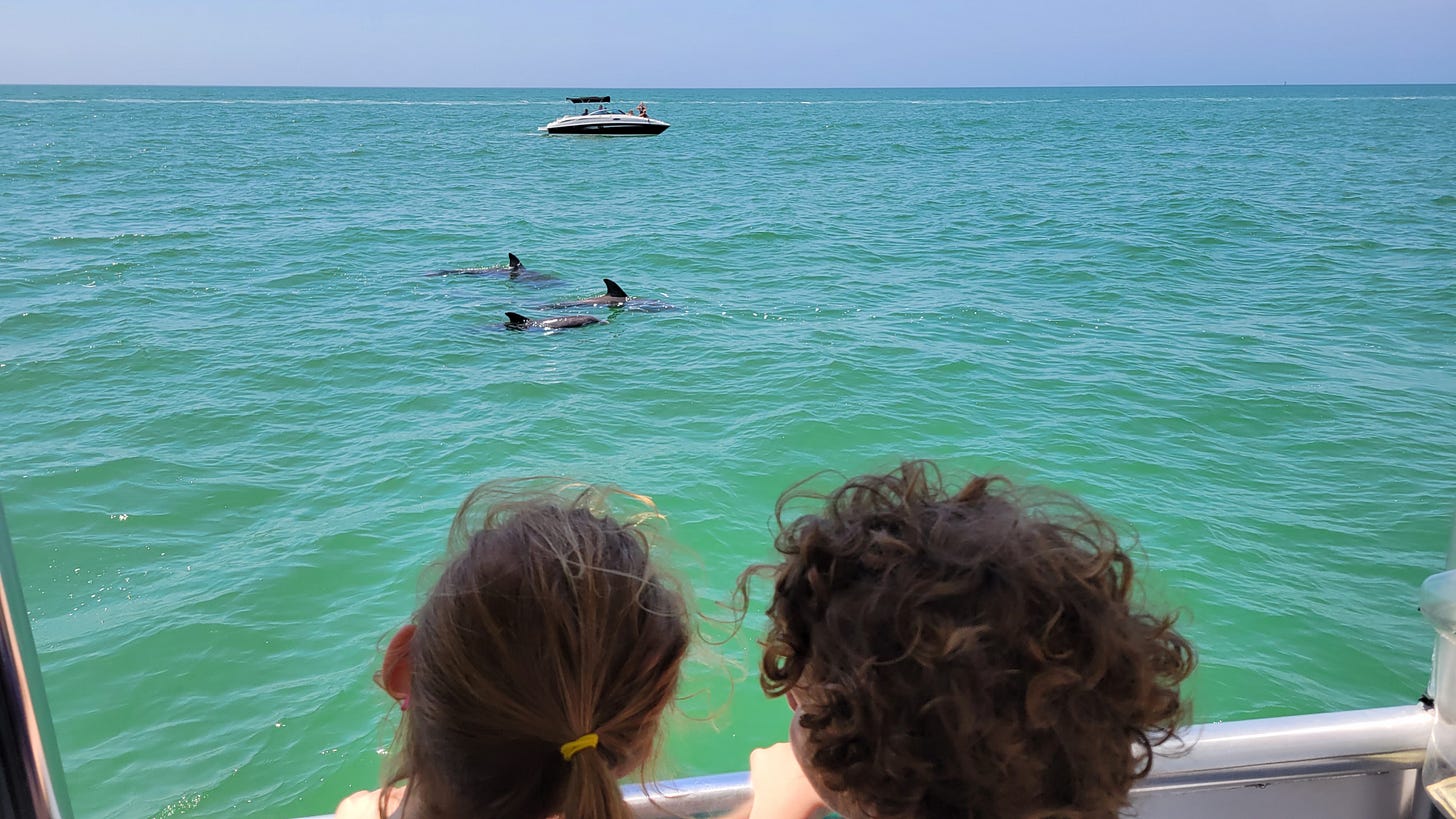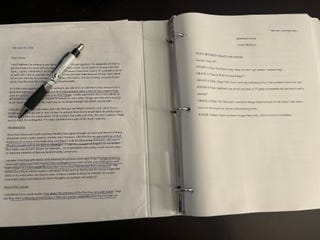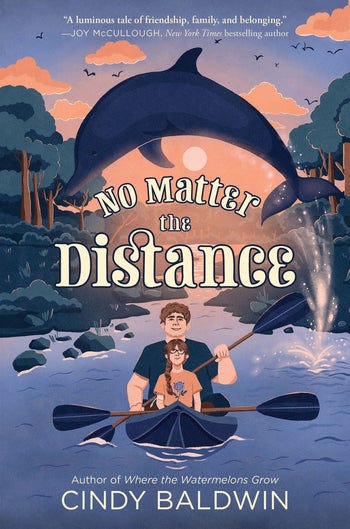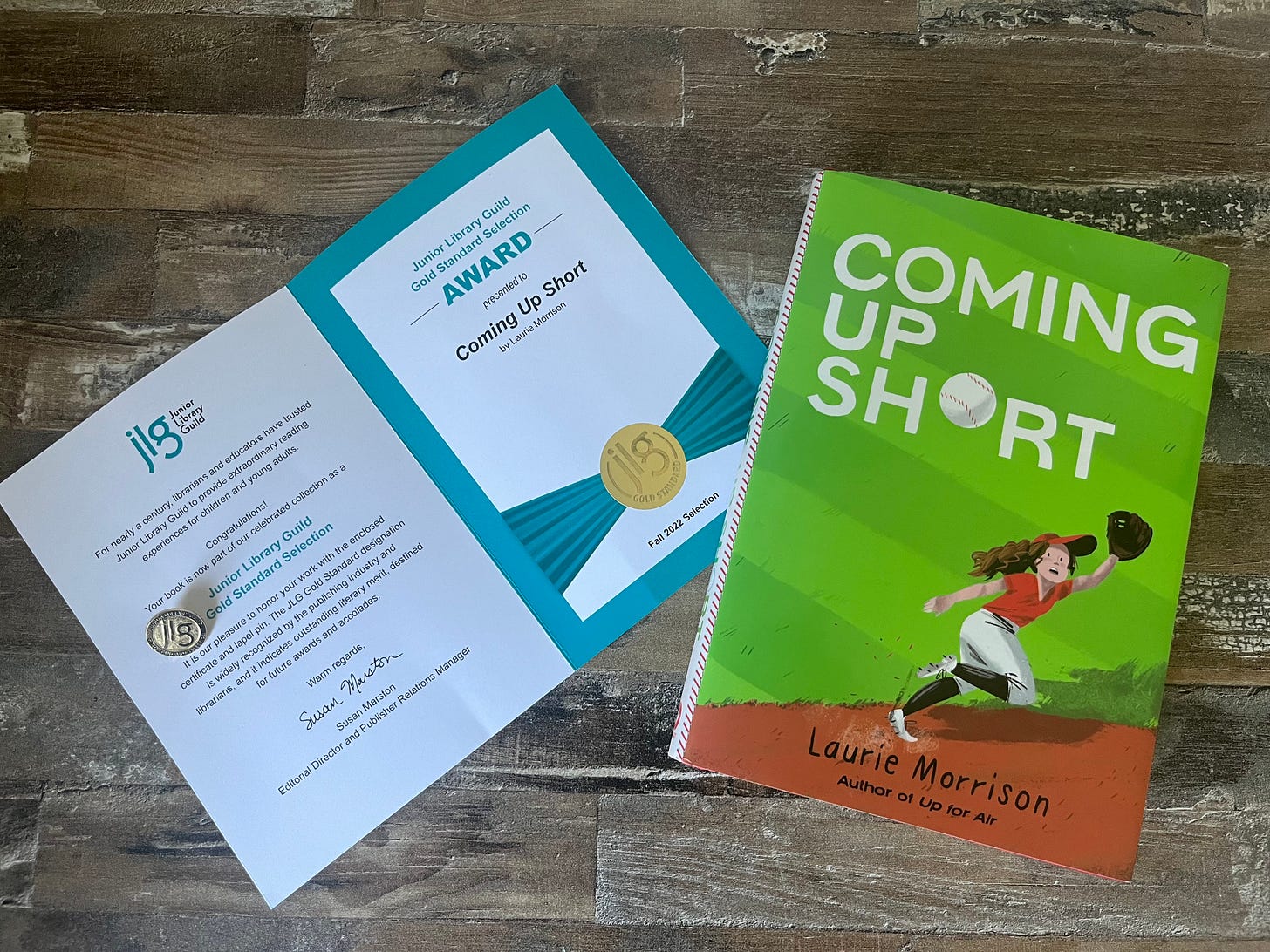On "manageable" revisions and trips
Reflections on spring break, developmental edits, and un-plannable magic, plus a 4-book giveaway, verse novel recommendation, and news!
Dear friends,
I’m writing this newsletter after a whirlwind February and March during which I completed a revision for my next novel and we took a family trip to Florida for my kids’ spring break, among many other less exciting things (SO MANY stomach bugs/colds/etc. this year—ugh).
I find traveling with small children pretty stressful, but I’m very glad we went away last week. We played on the beach, took a boat ride, saw dolphins and alligators (in different bodies of water), went to the final Phillies spring training game, and basked in the sunshine. My kids didn’t love flying (this was their first time, and the trip there was one of the most turbulent flights I’ve ever been on), but everything else was a hit.
As a parent—and especially as a parent of a neurodivergent kid—I struggle to balance the need to maintain routines and figure out plans that will feel manageable with the desire to make space for spontaneity, adventure, and joy. But on this trip, there was a little spontaneity and a lot of adventure and joy, and it was so special to watch my kids delight in brand new experiences.
I found myself thinking about the parallels between travel with kids and novel structure—in a book, the main character has to go somewhere new (whether literally, as in Coming Up Short, or figuratively/emotionally) in the second act of the three-act structure in order to change and grow and have adventures that are worth reading about. In real life, brand-new experiences can bring a lot of chances for things to go wrong—but they spark a lot of beautiful growth and perspective-broadening, too.
So even though I’m exhausted, I’m grateful for our trip, and I’m grateful that the kids are back at school this week and I’m back at my computer today, ready to share some reflections about the developmental edits I recently completed for my next contracted novel—let’s call it “running book” for now since it hasn’t yet been officially announced.
In general, after a writer turns in a full draft of a novel, the writer gets an editorial letter. These letters can range in length—the one I got this February was a few single-spaced pages, but they can be much longer. They tend to open with positives—reasons the editor loves the project and aspects of the manuscript that are already strong—and then the editor lays out specific areas to focus on for the revision. I’ve never gotten in-line comments on the manuscript at this stage, but I’ve only worked with one editor—maybe sometimes people do? (Tell me if you have!) But overall, developmental edits are a time to make global, big picture changes, before the next stage, line-edits, when the focus is more localized.
I don’t have one standard system that works for drafting a novel—each book has been different for me. But I do have a system for developmental edits. After I’ve had a day or two to digest the notes, I print out both my editor’s letter and the whole manuscript (I like the manuscript to be double-sided and hole-punched, so I can flip through it in a binder). I mark up the letter and take notes in a notebook on all the main things I need to address and all my preliminary ideas for tackling each point. Then I read through the manuscript, making notes in the margins (and/or on post-its I can stick to the pages if I need more space). I go back to the notebook to do more brainstorming and problem-solving until eventually, I have a specific, chapter-by-chapter plan for the revision, and finally, I dive back in, starting with chapter one and moving through the revision chronologically.
The developmental revision for my running book seemed very manageable. I’d had a relatively long time to write this novel, and I’d already gotten a couple rounds of very helpful feedback on a lot of the book from my critique group, so the full draft I turned in was in pretty good shape. I had a quick turnaround, but that didn’t worry me because the edits didn’t seem too daunting.
But the revision process ended up being a lot harder than I anticipated. That’s partly because the running book was already longer than I wanted it to be, and many of my editor’s notes (all of which I agreed would strengthen the book) involved adding, enriching, and bringing things full circle, so I was working to develop while also trimming. The running book is also tightly plotted against a calendar, which made the puzzle work of inserting new pieces more complicated. Plus, the overall shape of the story felt right as it was, so I didn’t want to mess with the emotional beats.
In fact, I had to stop, reassess, and change my revision plan a bit when I thought I was almost done with the edits because I realized I had added something that took emotional power away from the climax of the book—suddenly there were too many emotional ups and downs jumbled together at a point when I wanted the story to be moving toward a triumphant resolution.
In some ways, a more significant revision can be more straightforward than a relatively minor one. A few years ago, I rewrote much of the plot of the second half of Saint Ivy at the developmental edit stage. I made much more substantial changes to that book than this one, and it took me much longer to figure out my revision plan—a full two weeks rather than just a couple of days. But once I had the plan for Saint Ivy, I had a clear path forward. I didn’t get as confused, and I wasn’t as worried about “breaking” a book that was largely working.
Because as much as I love making strategic revision plans, there’s something special and un-plannable that happens sometimes with a story, when the emotions strike an especially deep chord and the characters and their relationships are especially captivating. There’s a hard-to-explain quality some books have—reading them reminds me of that spark I feel when I really, really click with someone. I don’t know how to describe it and I have no idea how writers achieve it, but when a book has it, I can feel it as I read. It’s kind of like—a book has charisma, if that makes any sense? Based on my own gut sense and the responses I’ve gotten from a few people who’ve read it, I think this running book has some of that un-plannable, resonant magic, which makes me very excited to get to share it with readers . . . and very nervous about messing it up!
So I hope I didn’t break any of what was working in the running book. I hope I didn’t get carried away and change more than I should have. I’ll be eager for the next round of edits later this spring—and eager to share more details about the book soon! And for now, I’m ready to make the slightly jarring shift from revising a pretty polished book to first drafting the brand new story I wrote a bit about in my last newsletter.
If you have any questions about the revision process for a contracted book, anything to share about your own experience, or any recommendations for books that have that special kind of spark, I’d love to hear from you!
Verse Novel Recommendation:
April is poetry month, and I recently read an outstanding middle grade verse novel: No Matter the Distance by Cindy Baldwin. No Matter the Distance is an important book, since it’s the first traditionally published novel about cystic fibrosis that’s written by an author who has CF, and it’s also such an enjoyable and absorbing read. The main character, Penny, develops a fascinating bond with a dolphin that will hook readers who love dolphins (who doesn’t!?), and so many kid and adult readers will relate to Penny’s struggles with recognizing that she is in many ways “lucky” (because her CF could be so much worse) while also giving herself space to feel and grieve what’s hard. This story is brimming with love, compassion, and wonder, and I highly recommend it!
News and a request:
I’m happy to share a couple of honors for Coming Up Short! Coming Up Short was a Junior Library Guild Gold Standard Selection, and I recently received a certificate and pin from JLG in honor of that recognition, which I’m delighted to have!
It’s also a nominee for the 2023-2024 Michigan Great Lakes Great Book Award, which means readers in Michigan will be much more likely to discover Bea’s story if they read the nominees and vote on their favorite. I’m so grateful for the recognition and kind of blown away by the company on this list!
If you’ve read and enjoyed Coming Up Short, would you please consider leaving a brief review on Amazon (you don’t have to have bought it there to review it there) and/or Goodreads? I stay way the heck away from my books’ pages on Goodreads so I have no idea what’s there, but I’ve noticed that Coming Up Short (and my other pandemic book baby, Saint Ivy) don’t have many reviews on Amazon, and reviews there can help with visibility even though I always encourage people to buy books from independent bookstores or Bookshop.org if possible. Thank you!
4-Book Baseball and Softball MG Giveaway:
I’ve teamed up with three other middle grade authors to celebrate the start of baseball and softball season with a four book giveaway! If you (or your kids or students) like sporty books that are about so much more than sports, then head over to the contest posts on Instagram or Twitter to find out more about these middle grade gems by Amanda Rawson Hill, Jacquetta Namar Feldman, and Skyler Schrempp and enter for a chance to win all four books.
Thank you, as always, for reading!
Love, Laurie






